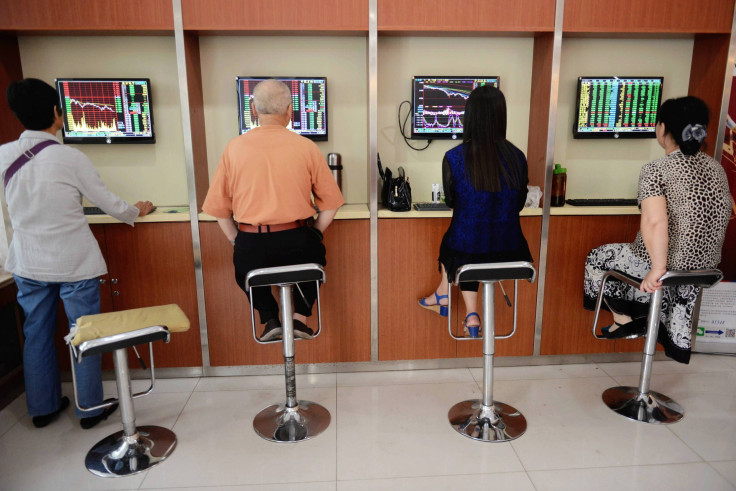China's Stock Markets End 2-Week Slump With Dramatic Rebound, As Government Steps In Ahead Of Communist Party's Birthday

SHANGHAI -- China’s stock markets confirmed their reputation for volatility on Tuesday -- with the main Shanghai Composite Index plunging sharply in morning trading, before rebounding more than 10 percent in the afternoon, for its biggest one-day rise in six years. The revival put a stop to more than two weeks of falling share values, which had wiped more than 20 percent off a bull market that had soared to a seven-year high earlier in June. Many analysts saw the rebound as linked to strategic government intervention, noting that it came just in time both for the end of the second quarter of the year, and for the Communist Party’s anniversary on July 1.
Central government funds were seen to have poured into the market since Monday, after a cut in interest rates over the weekend did not seem to be enough to stop the sell-off. And official media have also given much publicity over the past two days to the news that China’s state pension fund will be allowed to invest in the stock market for the first time, in a bid to boost the value of its assets, which are currently held in low-yielding bonds and bank accounts. While most estimates suggested this could bring another 1 trillion yuan ($160 billion) into the market, one official headline on Tuesday put the figure as high as 2 trillion yuan.
The moves came as China’s stock market regulator, the China Securities Regulatory Commission (CSRC), issued a statement on Monday saying that “a drastic correction goes against the healthy and stable functioning of the stock markets.”
The apparent intervention is another reminder of the government’s powerful influence on the stock market in China. While "real economy" factors, such as concerns about China’s slowing exports and economic growth, and the impact of a potential Greek exit from the euro, along with the fear of a market bubble, all played a part in the recent fall in share values, many analysts believe that official measures aimed at slowing the market’s boom (it had risen 150 percent in less than a year) played an equally significant role -- with a tightening of liquidity and new restrictions on brokerages lending money to investors to put into the market.
Now the authorities seem to be reassuring citizens that they do not want to see a further fall -- but some analysts have warned that the apparent policy of encouraging more citizens to invest in the stock markets, could leave the millions of retail investors, young and old, who have poured into the market for the first time amid the boom of recent months, at risk of losing their savings.
One office worker, quoted in Tuesday’s China Daily, summed up the public mood over recent months: "Back then I thought I must be stupid not investing in stocks as making money out of them was so easy," he said. "Now I think I'm even more stupid as the money I lost almost equals my annual salary."
It may be that the authorities are hoping that the recent plunge will encourage people to be more cautious -- without scaring them away completely, and leaving the market up 32.3 percent in the first six months of the year. CSRC spokesman Zhang Xiaojun, on Monday appeared confident that all was going to plan: "The margin financing and short selling activities have passed tests over the last two weeks and run normally. The risk is manageable.”
However some analysts say the latest attempts to bolster the market will add to a sense among investors that in the end, the government will always save them if the market falls. This was very much the mentality in the middle of the last decade, before a dramatic collapse in the market in 2007 and 2008 sent it into a six-year slump. And South China Morning Post columnist George Chen warned on Monday that this “dangerous idea” was gaining traction again -- and could lead to a bubble that would eventually, inevitably burst.
Yet while some worry about the wisdom of encouraging the investment of personal savings -- and the nation’s pension fund -- in a market that leading Chinese economist Wu Jinglian once famously described as a “casino,” others say the market can help unleash the latent potential of the vast amount of savings kept in low-interest bank accounts in China.
Liu Chuanzhi, chairman of Legend Holdings, and founder of PC maker Lenovo, told the South China Morning Post last week that he thought China’s stock market would continue to rise overall in the near future as the transfer of funds from savings into the markets continued. He said the authorities were keen for “the private sector and individual investors to take more of a leading role” in funding economic growth.
And in recent days Shanghai has confirmed that it will launch a new emerging industries board -- to rival the ChiNext board for new and hi-tech companies on China’s other main stock market in Shenzhen. With the ChiNext up more than 100 percent this year -- despite the recent falls -- it may be another draw that China’s market speculators cannot resist.
© Copyright IBTimes 2024. All rights reserved.





















